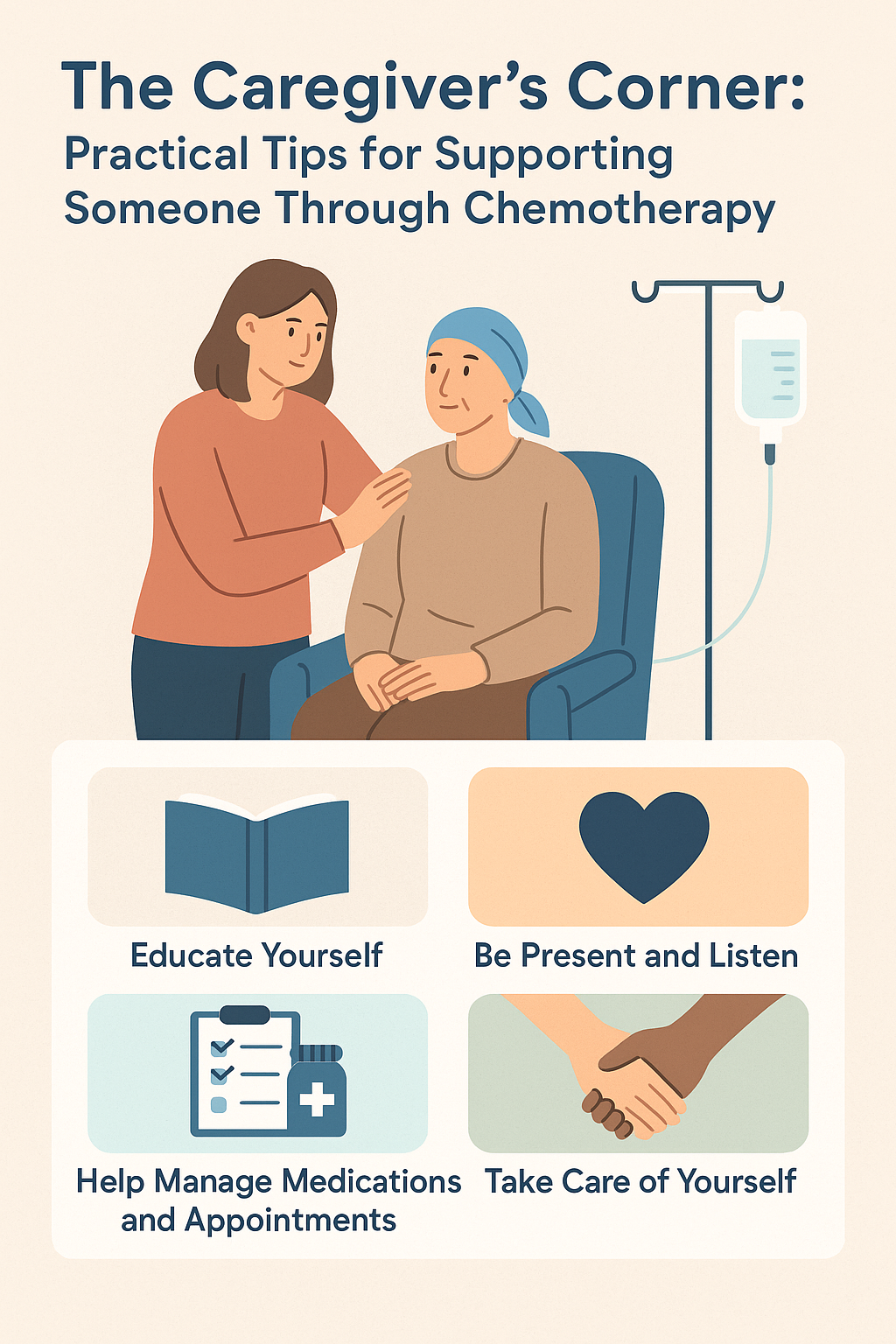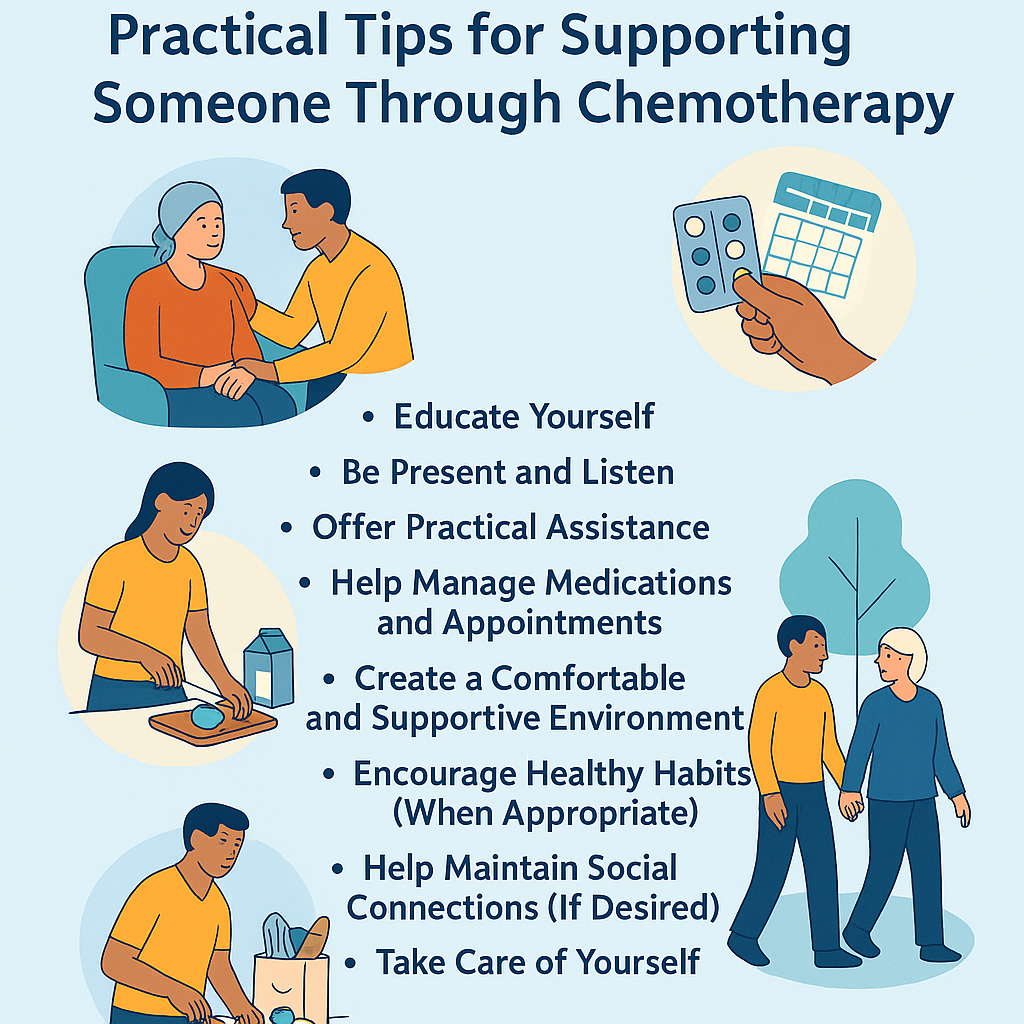Book Appointment Now

The Caregiver’s Corner: Practical Tips for Supporting Someone Through Chemotherapy
Introduction
When a loved one is diagnosed with cancer and begins chemotherapy, the focus understandably shifts to the patient. However, the journey through cancer treatment is not solely theirs. Caregivers – family members, partners, friends – play an indispensable role in providing practical and emotional support.
This article aims to offer actionable tips for those navigating the challenges of supporting someone undergoing chemotherapy, acknowledging their crucial contribution and providing guidance for this demanding yet vital role.
Understanding the Chemotherapy Journey
Chemotherapy involves using drugs to kill cancer cells. While it’s a cornerstone of treatment for many cancers, it can also bring about a range of side effects. Understanding the potential physical and emotional toll of chemotherapy is the first step in providing effective support. These side effects can vary greatly from person to person and may include fatigue, nausea, hair loss, changes in appetite, mouth sores and an increased risk of infection. Beyond the physical, patients may also experience anxiety, depression and feelings of isolation.

Practical Tips for Caregivers:
- Educate Yourself: Take the time to learn about the specific chemotherapy regimen your loved one is receiving and its potential side effects. This knowledge will empower you to anticipate challenges and provide informed support. Reliable sources include the patient’s medical team, reputable cancer organizations and trusted online resources.
- Be Present and Listen: Sometimes, the most powerful support is simply being there. Offer a listening ear without judgment. Allow your loved one to express their feelings, fears, and frustrations, even if they seem repetitive or negative. Your presence can be a significant source of comfort.
- Offer Practical Assistance: Chemotherapy can make everyday tasks overwhelming. Offer specific help with chores such as grocery shopping, meal preparation, cleaning, laundry, and transportation to appointments. Don’t just ask “What can I do?” Instead, suggest concrete ways you can assist.
- Help Manage Medications and Appointments: Keep track of medication schedules, dosages, and potential side effects. Offer to accompany your loved one to chemotherapy sessions and other medical appointments. Having a second pair of ears to listen to instructions and ask questions can be invaluable.
- Create a Comfortable and Supportive Environment: Ensure the home environment is conducive to rest and recovery. This might involve adjusting the temperature, dimming lights, or minimizing noise. Help create a space where your loved one feels safe and nurtured.
- Encourage Healthy Habits (When Appropriate): Gently encourage your loved one to maintain a healthy diet, stay hydrated, and engage in light physical activity if their medical team approves. However, be mindful of their energy levels and avoid pushing them beyond their limits.
- Help Maintain Social Connections (If Desired): Chemotherapy can lead to isolation. If your loved one feels up to it, help them stay connected with friends and family through visits, phone calls, or video chats. Social interaction can boost their spirits.
- Monitor for Side Effects and Report Concerns: Be vigilant in observing any new or worsening side effects. Know when to contact the medical team and don’t hesitate to do so if you have concerns. Your observations can provide crucial information for managing the patient’s care.
- Encourage Self-Care for the Patient: Remind your loved one that it’s okay to prioritize their well-being and engage in activities that bring them comfort and joy, even if it’s just for short periods.
- Take Care of Yourself: Caregiving is emotionally and physically demanding. It’s essential to prioritize your own well-being. Ensure you get enough rest, eat nutritious food, and engage in activities you enjoy. Seek support from other family members, friends, or caregiver support groups. Remember, you can’t effectively care for someone else if you’re running on empty.
The Importance of Your Role
TAs a caregiver, you are an integral part of the cancer care team. Your support can significantly impact your loved one’s physical comfort, emotional well-being and overall treatment experience. While the journey may be challenging, your dedication and care make a profound difference.

Conclusion
Supporting someone through chemotherapy requires patience, empathy, and a willingness to adapt to their changing needs. By understanding the treatment process, offering practical assistance, and prioritizing both your loved one’s and your own well-being, you can navigate this challenging time with strength and compassion. Remember that you are not alone, and there are resources available to support both patients and their caregivers. Don’t hesitate to reach out for help when needed.



